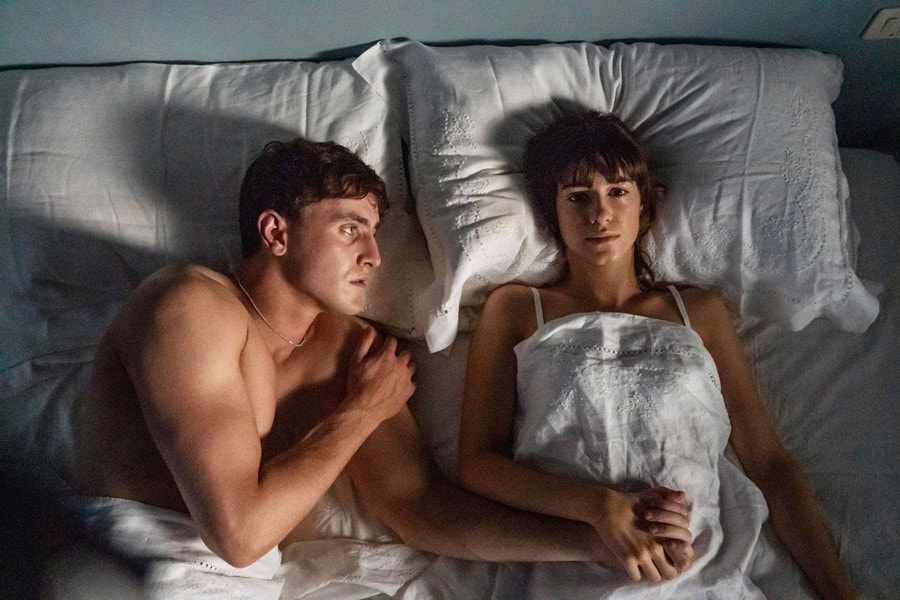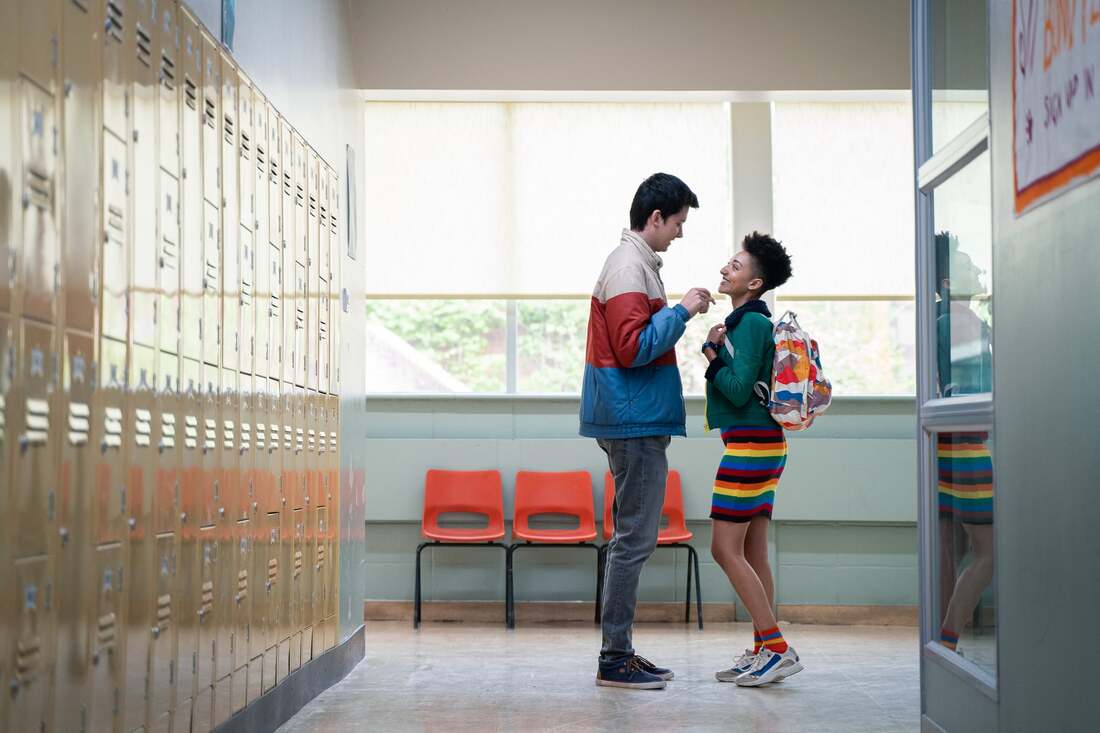More . . .
|
The revolutionary handling of Sally Rooney’s novel Normal People by directors Lenny Abrahamson and Hettie Macdonald has offered some sex-on-screen revelations these past few weeks — not only for the TV show’s depiction of consent-first sexual encounters but for raising public awareness of the role that intimacy coordinator Ita O’Brien played during the Hulu/BBC Three series, ensuring the comfort of actors Daisy Edgar-Jones and Paul Mescal at all times.
More . . .
0 Comments
Text Gunseli Yalcinkaya
How would you describe your role? Ita O’Brien: As an intimacy coordinator, we’re bringing to the industry a shift to help everybody know that just as with a dance or a fight, we’re doing intimate content, we’re bringing a skill and a structure that allows everyone to work professionally, which wasn’t there before. In that, we’re inviting clear communication from the get-go, right through the whole process, so everything’s understood, everything’s out in the open, and that the invitation is to speak openly, in a professional way, with adult language about intimate content. How much of the characters do you consider when crafting an intimate scene? Ita O’Brien: Intimacy work is about serving character, serving the writing, serving the director’s vision. And then, with that clear focus on character, you’re just making sure to honour what the scene is and putting it in place. You’ll speak to the director about what he or she wants from the scene and make sure the director has spoken to the actors. Once that’s happened, I’ll check-in with the actors as to any concerns, and once we’re on set, I’m present while they have the director rehearsal in that scene. It’s about the intention, where the characters are at this point in time. It’s about observing what the actors are offering, observing how they’re being in their body, and from that will emerge a basic shape, physically, in the scene. Then, once they’ve already got a basic shape, I’ll step in and start agreeing the touch and choreography. More . . . ABC: From Normal People to Game of Thrones, sex on screen matters for actors and audiences alike2/5/2020 By Siobhan Hegarty
In the last few years, high-profile actors, including GoT's Emilia Clarke and Frida star Salma Hayek, have said they were pressured (in Clarke's situation) or threatened (in Hayek's) to expose their bodies and partake in gratuitous simulated sex scenes. And this doesn't just affect the actors involved. It can warp audience's perspectives of the realities of sex and consent. That's something intimacy coordinator Ita O'Brien is fighting to change. "With the intimate content, it's your personal and private body that's at play," she points out. "An injury can go from purely physical, to emotional and psychological — when someone's body has been handled and touched in a way that is not suitable for that person and is not within their agreement and consent." O'Brien likens her role to a stunt coordinator — only she applies choreography and a consent-based framework to sexual content and nudity, rather than action sequences. Some of her most recent work can be seen on Normal People, the BBC and Hulu adaptation of Sally Rooney's 2018 book of the same name, which focusses on a teen romance in Ireland. (And involves quite a bit of sex.) "There's a scene in episode two, the first time making love, and for Marianne it's her experience of losing her virginity. That scene took all day, so I'm not saying that by choreographing a scene you're not going to make it exhausting. "But the intimacy coordination work is about everybody being in agreement and consent ... and absolutely every detail serving character, serving storytelling." More . . . By AMY KAUFMAN
“Normal People” isn’t about sex. It’s a quiet relationship drama that follows two Irish teenagers, Marianne and Connell, as they fall in and out of love over the course of their high school and collegiate years. But their intimacy is an integral part of the romance, and the way it’s depicted on screen is far more vulnerable and unhurried than in most Hollywood productions. Yes, there’s full-frontal nudity, but more impactful are the prolonged stares, breathy kisses and subtle skin grazes loaded with meaning. So how do you make sex scenes between two total strangers — who swear, just like post-”A Star Is Born” Bradley Cooper and Lady Gaga, that they’ve never dated — look so real? Hiring an intimacy coordinator, for starters. Lenny Abrahamson, who executive produced the series and also directed its first six episodes, admits he was initially hesitant when the idea was floated. He didn’t want Ita O’Brien — who has also coached actors on Netflix’s “Sex Education” and HBO’s “Gentleman Jack” — to come between him and the cast. “You’ve got a very clear vision in your head, and my fear was that an intimacy coordinator would come in, it would all flow away from me and by the end they’d be swinging from the chandeliers,” acknowledges Abrahamson, best known for directing the 2015 film “Room.” “But having her there did loads of important things, even down to the really practical, like: How is it possible to make something look real, and at the same time give the actors the comfort that it isn’t?” Of course, when Edgar-Jones and Mescal tried out for the show, both were made aware of what it would entail. The 21-year-old actress had “extensive conversations” with her mother before signing on to the project, ultimately deciding she was comfortable with the nudity because it was “incidental.” “When Connell comes in from the shower, he just happens to be putting his shorts on,” she explains via video chat from her home in north London, where she was quarantined with her boyfriend and two flatmates. “Whether the camera captures [his nudity] or not, there is an honesty there of what a real relationship’s like.” Mescal felt more at ease after an early discussion with the director in which he was reassured that Abrahamson wouldn’t be “didactic or forcing me into doing anything.” “I think I told them,” recalls Abrahamson, “that, yes, there’s a contractual dimension so people know where they stand, but whatever it says in those, it’s not, like, ‘Oh, I’m allowed to show you guys full-frontal nude, so I’m just gonna do that randomly.’” He showed the potential cast nude photographs taken by Nan Goldin to give them an example the of “un-exploitative, beautiful” approach he wanted to emulate. O’Brien weighed in during the casting process too, and felt confident that Mescal and Edgar-Jones could sell a connection despite the fact that she hadn’t watched them lock lips. “What you’re looking for is the electricity when they’re apart,” she says. “When you gradually bring those two magnets together, that’s what we can choreograph. That’s what chemistry is. It’s not about can two people actually kiss.” More . . . Popsugar: From Sex Education to Normal People, Ita O'Brien Choreographs Some of TV's Best Sex Scenes1/5/2020 by ANGELA LAW
The UK has produced two standout TV series in recent months: Sex Education (Netflix) and Normal People (BBC). Both follow a cast of teenagers as they navigate the many ups and downs of adulthood, and you would think that's where the similarities end. While Sex Education uses tongue-in-cheek humour to tackle heavier issues like sexuality and gender binaries, Normal People depicts first love and mental health in a quieter way, where the power is felt fully in long stares and things left unsaid. But when I sat down to watch Normal People, the intimate sex scenes reminded me of Sex Education a lot, even though they are worlds apart in terms of their tone and pace. Both shows deliver raw and honest depictions of sex across a spectrum of sexualities and desires, so naturally, it was a hot topic at the round-table interviews I attended for both series. When questioned about what it was like to film the huge number of sex scenes, there's one person that both shows' cast and crew credit for the believability: Ita O'Brien. An intimacy coordinator with a background in dancing, acting, and movement coaching, O'Brien has developed a set of guidelines to protect actors while filming sex scenes, and to ensure that networks are producing great intimate content. In both cases, the young actors said filming scenes under O'Brien's guidance was empowering — after a long day of filming, they felt confident and like they'd completed an honest day's work, despite the vulnerable positions the scenes put them in. On the day that O'Brien and I caught up (in our respective homes during the UK's novel coronavirus (COVID-19) lockdown), it was the day before her daughter's birthday. She started the interview by telling me all about the cake she planned to bake that evening, and what began as a scheduled 20-minute conversation evolved into almost two hours of chatting. Pretty quickly, it was obvious why O'Brien has been so successful in her business, pairing her extensive experience in the creative arts with her warm and empathetic personality. She is my favourite kind of person: a ballsy woman who's tough but undoubtedly kind. We spoke at length about the film industry and how it has historically approached intimate content, how it's evolved since the birth of Time's Up in early 2018, and exactly what it means to be an intimacy coordinator on set. More . . . BY MICHELLE RUIZ
It was never a question for Lenny Abrahamson, who directed Normal People along with Hettie Macdonald, that in order to truly capture the novel, the onscreen sex would have to feel intensely realistic. “You can’t suddenly become coy and prim about the human body,” Abrahamson told Vogue. “You need it to feel like when they went from talking into making love, that the conversation hadn’t ended.” But executing that erotic vision and navigating nudity with two young actors (Edgar-Jones is 21 and Mescal is 24) in their first major roles in a much-anticipated adaptation—and in an industry scarred by serial predators like Harvey Weinstein—meant Abrahamson approached sex scenes with a meticulous level of care. Moments like Marianne losing her virginity to Connell in his cramped bedroom or the couple fervently reuniting in her Dublin apartment may look completely natural, but were discussed and planned at length by Abrahamson, Edgar-Jones, Mescal, and intimacy coordinator Ita O’Brien to ensure the actors were comfortable and consenting. “If you go back a decade or more, it was all about the contract,” Abrahamson said of past nudity clauses established upfront, locking actors (often actresses) in before filming even started. But with the dawn of #MeToo exposing the sexual abuse and harassment endemic to Hollywood, Normal People is part of pioneering a new way to treat the sex scene. “A person has to be calm when it comes to this sort of material, otherwise it will backfire on everybody,” Abrahamson said. “The only way to go into it is to create the environment where people can talk and come to an agreement that feels right for everybody. There’s no way of guaranteeing it in advance by a set of contracts. That stuff that can’t work anymore.” For the sex scenes on Normal People, Abrahamson abided by an entirely new set of rules. To avoid gratuitous onscreen sex, he challenged himself: “to make sure that every time there’s a sex scene or we’re working with nudity, it’s there for a reason.” After establishing that the show’s intimate scenes were as integral to the characters’ on-and-off love story as any other, the director, actors, and O’Brien would have a frank talk: “What does the sex look like in this scene? What’s it telling us? Is it slow and gentle? Is it intense and immediate? Is it connected or disconnected?” Abrahamson recalled. “Let’s talk about when climax happens.” O’Brien, a dancer and movement teacher, brought a discerning eye toward reality. “I hate it when there’s intercourse and there’s never been a moment of penetration,” she told Vogue of typically contrived onscreen sex. Likewise, “When’s the moment of withdrawal?” (O’Brien urged the crew against cute nicknames for genitalia, using instead the proper “penis” and “vagina.”) With input from the actors, Abrahamson and O’Brien choreographed the onscreen sex practically down to the thrust, and rehearsed with the actors clothed, encouraging them to establish personal boundaries. “We’d agree on touch, so Paul and I were clear,” Edgar-Jones told Vogue. The result was no “fear of overstepping boundaries, as we knew exactly what the other was comfortable with.” O’Brien, who has also served as intimacy coordinator on shows including Netflix’s Sex Education, Watchmen, and Gentleman Jack, says it’s all part of an industry shift. “We’re inviting a positive ‘no,’” she added of actors’ consent. “Where is your ‘yes’? Where is your ‘no?’” (“Maybe,” she notes, counts as a “no”—as there can be no room for ambiguity.) After #MeToo and Time’s Up, she said, “my phone hasn’t stopped ringing.” Abrahamson admits he was initially skeptical about the production hiring O’Brien, worried she could interfere with his relationship with Edgar-Jones and Mescal. But the director quickly realized that the presence of an intimacy coordinator protects not only the actors, but the filmmakers too. “I would always worry that if I’m interested in doing something and if the actor wasn’t comfortable with it, maybe they would feel like they wouldn’t want to disappoint me and therefore they might say, ‘Sure, let’s do it,’” Abrahamson said. (At times, he wouldn’t bother to make the ask, not wanting to put the actor in a difficult position.) But an intimacy coordinator, he said, takes that lingering worry “out of the equation, because it is so focused on rooting out anything that the actor doesn’t feel comfortable with and encouraging them not to do it.” Abrahamson was so attentive to the potentially vulnerable dynamic of directing young actors engaging in nudity and vivid sex scenes, that he all but gave Edgar-Jones and Mescal final-cut privileges. “We had a thing where they had the right to see everything we shot at any point. They also had the right to watch the show before it gets broadcast,” he said. “I can tell you if there was anything that they didn’t want to be in it, I would have taken it out.” The irony may be that Normal People’s serious and structured approach to sex allowed the actors to be “more natural and free,” Edgar-Jones said. More . . . |
By publication
All
Archives
October 2023
|







 RSS Feed
RSS Feed
